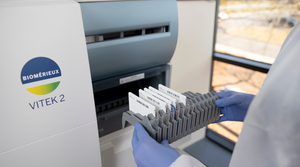ICU Medical Plum Pump Replacement Batteries Hit with Class I Recall
The batteries contain a defect that may substantially diminish how long it can be used to run the system when not plugged into AC power.

ICU Medical has issued an Urgent Medical Device Correction identifying that replacement batteries for its Plum 360, Plum A+, and Plum A+3 Infusion systems have a manufacturing defect that substantially diminishes how long they can be used to run the system when not plugged into AC power.
The Plum 360, Plum A+, and Plum A+3 are large volume infusion pumps used to give fluids in controlled amounts and rates. They can deliver blood or blood products, drugs, and other fluid mixtures through subcutaneous, intramuscular, intravenous, and intrathecal administration.
Reported as a Class I recall, the FDA said there has been 1,904 devices recalled in the United States with distribution dates between Feb. 7, 2022, and Dec. 22, 2022. The recall notice highlighted that the risk occurs when the device is running on battery power — like when a patient is being transported — and there is no AC power backup available. Due to the defect, the system may shut down an ongoing infusion and power down sooner then expected.
The risks of infusion interruption, under-infusion, or delays in delivery of critical fluids, blood products, and medication may cause serious injury or death. Currently, ICU has received 54 (Plum 360) and 465 (Plum A+/A+3) complaints regarding battery life but no reports of any injuries or deaths. The FDA has identified an adverse event that may be related.
The company and FDA are urging device users to keep the pump plugged into AC power whenever possible, and when not, to closely monitor the battery status indicator to ensure sufficient battery capacity. It is also suggested to have a backup pump available during all infusions — especially when delivering critical medications. If a pump displays the replace battery alarm, users are to continue the infusion using a different pump and to remove the defective device from clinical use until the battery is replaced.
ICU said that biomedical engineers should ensure that all users or potential users of the pump are made aware of the defect. Additionally, they’ve been given permission to replace affected batteries with a new CSB battery until correct batteries are available. The company will replace all affected batteries and will contact its customers when there’s availability to schedule a battery replacement.
About the Author(s)
You May Also Like



